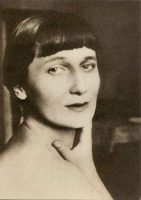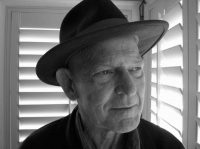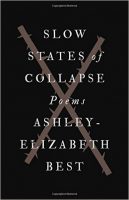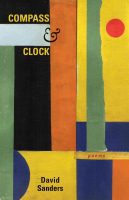June 23, 2016
Edited by David Sanders
Specimen Days
1612—Justus G Schottel, [Schottelius], German poet, is born.
1889—Anna Akhmatova, Bolshoy Fontan near Odessa. Russian poet (d. 1966), is born.
1991—Antonio Jacinto, Angolan poet, dies at 66.
2005—Manolis Anagnostakis, Greek poet (b. 1925), dies.

You Will Hear Thunder
You will hear thunder and remember me,
And think: she wanted storms. The rim
Of the sky will be the color of hard crimson,
And your heart, as it was then, will be on fire.
That day in Moscow, it will all come true,
when, for the last time, I take my leave,
And hasten to the heights that I have longed for,
Leaving my shadow still to be with you.
—Anna Akhmatova (1889-1966)
“You will hear thunder and remember me, / And think: she wanted storms.”—Anna Akhmatova (1889-1966)
World Poetry
Poet Laureate's Lament for the Orlando Dead… by Declaring God is Gay
She has been lambasted for ignoring her Royal role by preferring to write about gas meters rather than the Queen’s 90th birthday. Now Poet Laureate Carol Ann Duffy is risking even more criticism by declaring: ‘God is gay.’ The claim appears in a new poem she has written in the wake of the massacre of 49 people in a gay club in Orlando, Florida, last weekend.
British Poet Laureate Carol Ann Duffy is risking criticism by declaring: ‘God is gay.’
Recent Reviews
Cain by Luke Kennard
by Charles Whalley
The Harbour Beyond the Movie (2007), Luke Kennard’s second collection, includes the sequence ‘The Murderer’. The speaker, apparently in a government programme, is caring for a ‘murderer’, taking him for coffee and picnics as part of the ‘rehabilitation process’. But safe in the certainty that, whatever they do (short of a murder), the speaker will always be morally superior, they continually torment their ward, refusing to acknowledge the ‘murderer’ as anything else, refusing to allow him to progress beyond his past crime.
Look by Solmaz Sharif
by Brandon Amico
“Until now, now that I’ve reached my thirties: / All my Muse’s poetry has been harmless: / American and diplomatic.” It’s hard not to hear underpinning this passage, which opens the poem “Desired Appreciation,” the suggestion that for something to be accepted as American it must go along with the current, must uphold the status quo—the exact opposite of how art functions, which is by disruption. And lest there be any misunderstanding, I’ll clarify—Solmaz Sharif’s Look is a book that disrupts, fervently and effectively. The poems within are allergic to complacency and linguistic hypnosis; they constantly reach, inquire, prod, and wonder—sometimes with force—and refuse to allow the reader to be lulled into the sense that everything is okay in the world.
Wear Your Wig
by Christopher Spaid
Terrance Hayes is taking us farther out. His early books grounded us on mostly recognizable earth. Muscular Music (1999), his debut, opened “At Pegasus,” a (sadly fictional) Greek-mythology-themed gay bar. His next collection, Hip Logic (2002), reintroduced Hayes as an “emcee,” with “triple X / Jeans” and a “grin of gold-plated windows.” But with the first poem of Lighthead (2010), “Lighthead’s Guide to the Galaxy,” Hayes launched into space and out of time: “Ladies and gentlemen, ghosts and children of the state, / I am here because I could never get the hang of Time.” His latest, How to Be Drawn (2015), starts, with the poem “What It Look Like,” by addressing the dead.
Terrance Hayes’ latest, How to Be Drawn (2015), starts, with the poem “What It Look Like,” by addressing the dead.
Broadsides
Holy City Adrift: On the Occasion of Thomas McGrath’s Centenary Year
By Andrew Lyndon Knighton
On an otherwise innocuous summer morning in July 2013, a gasoline tanker carrying 8,500 gallons of fuel careened out of control in a tunnel connecting two arterial freeways just a bit north of downtown Los Angeles. Crashing into the tunnel wall, it unleashed a spectacular fireball and a series of terrifying explosions. Improbably, the driver escaped and no one else was seriously injured, but the inferno captured the city’s jaded imagination for a day. The mouth of the tunnel breathed a wall of flame into the open air, gasoline runoff fed fires burning in the nearby Los Angeles River, and smoke belched forth from storm drains for blocks around. The LAFD advised people to avoid manhole covers, lest they erupt into the air from the subterranean force; eyewitnesses pondered the spectacle of rats scrambling to the surface streets in flight. The resulting traffic jam, of course, was all but unspeakable.
The Strange Power of a Medieval Poem about the Death of a Child
By Josephine Livingstone
The medieval poem “Pearl” was written by someone whose identity we do not know, and is set mostly within a dream. Neither of these facts is unusual in medieval poetry. Authorship is often unclear for works from that period, and dreams were popular as literary devices: then, as now, dreams allow poets to illustrate ideas that might otherwise be inexpressible. The “Pearl” poet used the technique to account for an experience that still seems impossible to describe—the loss of a child
Respect Due: Symposium on the Work of Kwame Dawes

Welcome to the first two forums of the inaugural Poetry International symposium on the work of a major poet. Kwame Dawes is deserving of many superlatives, but crucial is the word that most came to mind throughout this symposium’s process, especially in reading the marvelous essays we received and include over the next weeks. One of our contributors, in correspondence, noted that the act of reflection made her “want to pull a stack of Kwame’s books off my shelf and sit and read every single one of them!” Agreed.
Poetry International has posted an online symposium on the work of Prairie Schooner editor Kwame Dawes.
Drafts & Fragments
'No drugs on the bus': Carol Ann Duffy Takes a Road Trip
by Alex Clark

There is, of course, form in this sort of thing: the Beatles’ Magical Mystery Tour, featuring English eccentric Viv Stanshall and Scottish humorist Ivor Cutler; Ken Kesey’s bus Further, filled with Merry Pranksters, driven by key Beat Generation member Neal Cassady and commemorated in 1968 in Tom Wolfe’s The Electric Kool-Aid Acid Test; the Union Jack-emblazoned bus that carted Sporty, Posh, Ginger, Scary and Baby around in Spice World. Now Carol Ann Duffy, the UK’s poet laureate, has invited three poets to join her on a road trip through England, Wales and Scotland, which will take them from Falmouth to St Andrews over the course of a fortnight. “No drugs on the bus!” she says, which won’t be a problem, although Gillian Clarke, the outgoing national poet of Wales, insists on some good red wine.
British poet laureate Carol Ann Duffy is embarking on a road trip through England, Wales, and Scotland.
Poetry In the News
Poem about Struggle 'to love this world as it is' Goes Viral

A poem by US poet Maggie Smith that tackles “how hard it is to love this world as it is, and to teach my kids to love it”, has gone viral in the wake of this week’s tragedies. Smith, who has released three books of poetry with small presses and won the Independent Publisher book awards’ gold medal in poetry for her collection The Well Speaks of Its Own Poison, published the poem, Good Bones, in the new issue of American literary journal Waxwing on Wednesday.
Bill Berkson, San Francisco Poet, Art Critic and Teacher, Dies

Bill Berkson, a prolific San Francisco poet who also forged a career as an art critic and beloved teacher, has died. Mr. Berkson suffered a heart attack Thursday morning, said his stepdaughter, Nina Lewallen. He was 76.
Bill Berkson, a prolific San Francisco poet who also forged a career as an art critic and beloved teacher, has died.
New Books
Mortal Trash: Poems by Kim Addonizio
[Hardcover] W. W. Norton & Company, 112 pp., $25.95

Passionate and irreverent, Mortal Trash transports the readers into a world of wit, lament, and desire. In a section called “Over the Bright and Darkened Lands,” canonical poems are torqued into new shapes. “Except Thou Ravish Me,” reimagines John Donne’s famous “Batter my heart, Three-person’d God” as told from the perspective of a victim of domestic violence. Like Pablo Neruda, Addonizio hears “a swarm of objects that call without being answered”: hospital crash carts, lawn gnomes, Evian bottles, wind-up Christmas creches, edible panties, cracked mirrors. Whether comic, elegiac, or ironic, the poems in Mortal Trash remind us of the beauty and absurdity of our time on earth.
Collected Poems: 1944-1979 by Kingsley Amis
[Paperback] NYRB Poets, 168 pp., $14.00
Kingsley Amis’s poetry tackles all the grimly humorous subjects he tackled in his novels—lust, lost love, booze, money and the lack of it, old age, death—and does so with immense formal poise. A master of both traditional and unconventional meters with a perfect ear for parody, Amis wrote satires, epigrams, and rueful and scornful songs that are remarkable not only for their virtuosity and humor but for their scabrous realism. It all adds up to a small, entirely individual, and memorably bracing body of work. As Amis writes: “Beauty, they tell me, is a dangerous thing, / Whose touch will burn, but I’m asbestos, see?”
Slow States of Collapse: Poems by Ashley-Elizabeth Best
[Paperback] ECW Press, 104 pp., $18.95

In her debut collection, Ashley-Elizabeth Best explores the cultivation of resilience during uncertain and often trying times. It’s a book built around day-to-day conflicts — poems about love, family, grief, power, and longing. Navigating the fault lines of popular culture and traditional poetry to assert that we are all history makers, Slow States of Collapse enters the landscape of personal narrative in an attempt to reconcile life’s little universal griefs.
Divine Nothingness: Poems by Gerald Stern
[Paperback] W. W. Norton & Company, 112 pp., $16.95
From the National Book Award–winning author of This Time, a new volume of poems that explore the very nature of existence. Divine Nothingness is a meditative reflection on the poet’s past and an elegy to love and the experience of the senses in the face of mortality. From the Jersey side of the Delaware River in Lambertville, Gerald Stern explores questions about who and why we are, locating nothingness in the divine and the divine in nothingness.
The Laughter of the Sphinx by Michael Palmer
[Paperback] New Directions, 96 pp., $15.95

Michael Palmer’s new book―a collection in two parts, “The Laughter of the Sphinx” and “Still (a cantata―or nada―for Sister Satan)”―contains 52 poems. The title poem begins “The laughter of the Sphinx / caused my eyes to bleed” and haunts us with the ruin we are making of our world, even as Palmer revels in its incredible beauty. Such central tensions in The Laughter of the Sphinx―between beauty and loss, love and death, motion and rest, knowledge and ignorance―glow in Palmer’s lyrical play of light and entirely hypnotize the reader. The stakes, as always with Palmer, are very high, essentially life and death: “Please favor us with a reply / regarding our one-time offer / which will soon expire.”
Passionate and irreverent, Kim Addonizio’s Mortal Trash transports the readers into a world of wit, lament, and desire.
Correspondences
Vermont's Poet Laureate Chard DeNiord On Poetry, Vermont And Grief
by Mitch Wertlieb

Chard deNiord was appointed to the post last year. He lives in Westminster West and was the co-founder of the New England College MFA program in poetry, and teaches at Providence College. He's also the author of numerous collections of poetry including Night Mowing, Sharp Golden Thorne and The Double Truth, and a collection of interviews with poets called Sad Friends, Drowned Lovers, Stapled Songs. His latest volume of poetry is called interstate.
The Rumpus Interview with Ravi Shankar
by Ann Van Buren

I met co-editors Ravi Shankar and Alvin Pang in New Haven, at a public discussion of their recent anthology, Union: 15 Years of Drunken Boat, 50 Years of Writing from Singapore (Ethos Books and Drunken Boat, 2015). Inspired by their global perspective (they talked about their travels to poetry festivals in India and Nicaragua), and by the collaborative nature of three recent books, I asked Ravi for an interview. He was planning a trip to a poetry festival in Vietnam, and Alvin was headed back to his home country of Singapore. I had to act quickly. Within a few days, Ravi sent me three books of his to read. They included Union, the anthology of Singaporean writing; What Else Could It Be: Ekphrastics and Collaborations (Carolina Wren Press: Poetry Series Seventeen, 2015), and Andal: The Autobiography of a Goddess, translated and edited by Priya Sarukkai Chabria and Ravi Shankar (Zubaan Publishers, New Delhi, 2015). Ravi came down to meet me at ArtsWestchester, in White Plains, New York.
Poet and musician Ravi Shankar was recently interviewed by The Rumpus.
Envoi: Editor’s Notes

I’m disinclined to participate in self-promotion. Having said that, I am going to allow myself the posting here of the link to an interview I did with a good friend of mine, memoirist and essayist Richard Gilbert. The interview was conducted following the recent publication of my book of poetry, Compass and Clock. Richard and I talked over a long lunch about the poems in the book, about craft, and about the similarities between poetry and non-fiction. We followed up with some back-and-forth via email.
If you read something in the interview that intrigues you, please feel free to comment at the bottom of Richard’s blog post. I would appreciate your response, and I know Richard would as well.
An interview between Poetry News in Review editor David Sanders and memoirist Richard Gilbert.